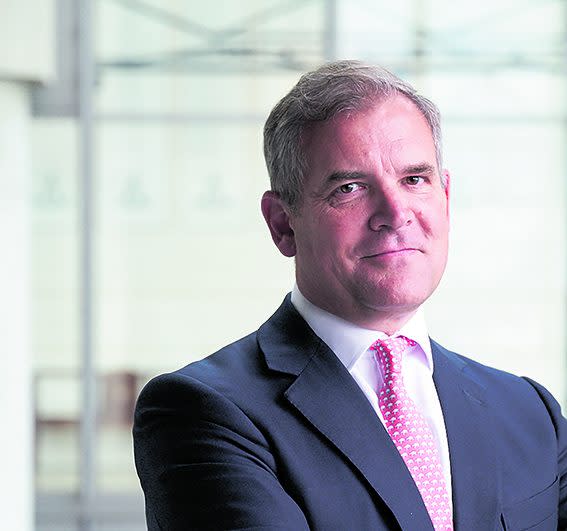Lloyd’s chair: This Bazball fan thinks the City needs to play with more risk

Charlie Conchie interviews the biggest movers and shakers in tech, fintech and financial services. This week, it’s MCC and Lloyd’s of London Chair, Bruce Carnegie-Brown.
The City, said MCC and Lloyd’s of London chair Bruce Carnegie-Brown in June, should be a bit more like the England cricket team.
England had just stormed past New Zealand and then-world test champions India, won a 2020 World Cup, eased past Pakistan and performed one of the greatest revivals of any sports team in living memory. Down on its luck, the City could use a sprinkle of the Bazball magic that had won back England’s vim, he said.
Since then, both worlds have fallen on more troubling times. England have drawn an (exciting) Ashes series, slumped out of a catastrophic World Cup, and a flood of firms have continued to fire barbs at the conservative investors of the Square Mile..
“It’s an example of a style of cricket that has rewarded England well, [but] it’s not without its dangers when the wickets start tumbling,” Carnegie-Brown tells City A.M. in an interview.
Sitting atop the world’s most historic insurance market in the City of London, however, he is still confident London is readying a lower order fightback.
All rounder
Carnegie-Brown is something of an all-rounder in the Square Mile. After ascending to run JP Morgan’s Asia-Pacific business, he made the shift into insurance as chief of Marsh before a stint at private equity giant 3i and a directorship at Close Brothers.
Alongside his current roles as chair of the MCC and Lloyd’s chair, he now holds board positions with Santander UK, fintech firm Cuvva and industry group the City UK.
That sprawling career has given him a panoramic view of the troubles facing e UK’s financial services sector this year.
Insurance is a big, invaluable asset for the country
A slew of reforms are being pushed through to try and revitalise its flagging markets, and parties on both sides of the political aisle are launching policy offensives to boost investment. While the attention is welcome, Carnegie-Brown says the underlying issue and potential remedy may be down to a more fundamental mindset shift. And the private sector should be at the heart of that.
“I have some concerns that essentially what’s happened over the last period of time is that governments, not just in this country but around the world, have nationalised risk for their citizens,” he says.
“Rather than thinking about it as the private sector needing help from government, it’s actually government who should turn it the other way around and say, ‘we have all of these risks, how are we going to manage them’.”

Embracing risk
Insurance of course, is a business steeped in that risk. The industry was formed in the Square Mile some 335 years ago as ship captains gathered in Edward Lloyd’s Coffee House and merchants offered to reimburse ship owners for the loss of cargo and vessels in exchange for an upfront payment.
It remains something of a jewel in the crown of London’s markets. The sector made up 24 per cent of the City’s GDP in 2020 data and the capital remains the only city in the world where every top-20 insurance and reinsurance firm has a base, according to the Global Cities Report of 2021.
In the corporate re-insurance market, London controlled 11 percent of total premiums in 2020 making it the largest underwriting centre globally by market share for insurance and the third largest for reinsurance.
That position is still a “big, invaluable asset for the country”, says Carnegie-Brown.
Even with its historic base though (and carrying the popular perception of an industry partial to a lunchtime tipple), he insists the market has been busy modernising behind the scenes.
“You see it in terms of ships going through war zones, for instance. Historically, you’d have to buy your cover at the beginning of the year, making some assumption about which of your ships was going to go into a war zone.
“Now with transponders, we can switch on the war cover when you go into the zone and switch them off [when they leave].”
In the physical sense too it’s making changes. While the “convening space of bringing people together” at Lloyd’s will “continue for some time”, the firm has pumped cash into a refurb to allow a more hybrid approach.
Lloyd’s is also now renegotiating its lease on its iconic base with the intention of making it a more hybrid market in future.
Historic challenge
But as with most of the markets in the capital over the past seven years, that global status has been well and truly challenged.
New centres like Singapore and Dubai and Miami had been vying to snap up the post-Brexit business while London’s share of the market has remained largely flat.
Political turmoil, climate catastrophe and wars over the past two years have sent premiums across the industry soaring but also placed new pressures on London’s role within it.
If you have the expertise in London, then the business will come – and so will the capital.
Regulation too has been something of a barrier. Even with a new growth and competitiveness mandate from government, he argues it’s “one thing to put it on the books and another to implement it”.
And to fight off that challenge, the City needs to both get on the front foot and beef up its strengths.
“What we’ve tried to do to respond in Lloyds and in the London insurance market more broadly, is to double down on expertise as the key differentiator of capability.
“If you have the expertise in London, then the business will come – and so will the capital.”
The approach is playing out in the numbers for Lloyd’s. In its most recent half year results, the group posted an underwriting profit of £2.5bn, up from £1.2bn last year, and an investment return of £1.8bn from a £3.1bn loss in the same period last year.
On the front foot
New initiatives are now providing the attacking depth. Lloyd’s rolled out its London Bridge programme in 2021 to open up access to a wider pool of institutional investors, drawing in some $200m in the first year. Last summer it broadened out the scheme again with London Bridge 2.
That “front footedness” now needs to be adopted across the City, he says.
Just as Jonny Bairstow laid the marker for the new Bazball regime when he blasted 114 to help England chase down India with ease in 2022, it’s time for the Square Mile to do something similar.
“If you’re not more front footed, we end up with lots of dull draws,” Carnegie-Brown adds. “We need to seize the exciting opportunities that the game of cricket, and indeed the City, represent.”

 Yahoo Finance
Yahoo Finance 